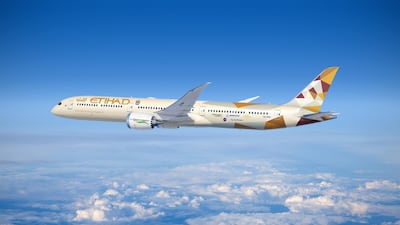Etihad Airways and Boeing signed an agreement to provide maintenance support for the airline's 787 fleet of wide-bodied jets, as part of a strategic partnership signed in November 2019.
The agreement covers a component services programme for more than 300 operational critical parts for Etihad’s 787 fleet, a landing gear exchange programme that includes aircraft on ground coverage, high value airframe components and digital products, Etihad said in a statement on Wednesday.
"By partnering with Boeing as the OEM of Etihad’s 787s, we ensure that the fleet receives the highest levels of maintenance support to increase reliability and efficiency," Mohammad Al Bulooki, Etihad Airways' chief operating officer, said. “This is an important demonstration of Etihad’s ongoing focus toward the post-Covid world."
The 787 twin-engine aircraft is the backbone of Etihad's fleet.
The 10-year agreements covering supply chain elements will help the airline simplify asset and maintenance management, reduce spare parts costs and improve parts availability, Boeing said in a separate statement on Wednesday.
The agreement comes as Etihad resumes flights and gradually returns to more destinations on its global network.
The Abu Dhabi carrier is set to add 15 new cities to its flight schedule from July 16, meaning it will fly to 40 destinations across the world next month.
On July 20, Etihad Airways and Boeing said they will use a brand new 787-10 Dreamliner to test various methods of sustainable flying.
The announcement was revealed on the first day of FIA Connect, the virtual event replacing the Farnborough International Airshow 2020, which was cancelled due to the coronavirus pandemic.
Ahead of putting its newest Dreamliner into service, Etihad will work with Boeing to use the jet as a test bed for technologies that can help reduce fuel consumption, noise pollution and carbon dioxide emissions. It's the next step in a strategic partnership that the two companies first announced at the Dubai Airshow last year, in a bid to improve airspace efficiency, reduce fuel use and cut aviation carbon dioxide emissions.
These test flights that Etihad is conducting with Boeing will measure aircraft noise from sensors installed on the aircraft and on the ground. The companies will harness data that will be used to improve the sound reduction potential of future aircraft design.
Earlier this year, Etihad revealed plans to cut carbon emissions to zero by 2050 and to 50 per cent by 2035 as part of its expanded commitment to environmental sustainability.
The airline said it will start new internal initiatives as well as collaborate with industry partners to reach the new targets.

